Making connections for change
 The 2013 is underway and the energy in the Brody Hall Auditorium is high and fun. I’ve already had conversations with former Progress Michigan Executive Director David Holtz, outgoing ED Zack Pohl, radio host Tony Trupiano, Katie Oppenheim, Julia Smith-Heck, Elizabeth Pellerito and Elizabeth from the Michigan Nurses Association and others. Word has it that Democratic gubernatorial candidate Mark Schauer will be stopping by at some point today. Needless to say, while the program looks to be terrific, the networking is equally important and the opportunities are lush.
The 2013 is underway and the energy in the Brody Hall Auditorium is high and fun. I’ve already had conversations with former Progress Michigan Executive Director David Holtz, outgoing ED Zack Pohl, radio host Tony Trupiano, Katie Oppenheim, Julia Smith-Heck, Elizabeth Pellerito and Elizabeth from the Michigan Nurses Association and others. Word has it that Democratic gubernatorial candidate Mark Schauer will be stopping by at some point today. Needless to say, while the program looks to be terrific, the networking is equally important and the opportunities are lush.
The program will start soon and I’ll be updating throughout the day so stop back often.

The first speaker is Lila Cabill the President Emeritus of the The Rosa and Raymond Parks Institute for Self Development.
 “We stand here today to tell her story so that the activists here today are inspired by her activism and “the power of one.”
“We stand here today to tell her story so that the activists here today are inspired by her activism and “the power of one.”
“In our work on voting rights, we use young people to help get out our message. We need the youth to help us protect the vote. They need to grow up with that in them that voting rights must be protected.”
“Take a long breath, breath out and then inhale the spirit of Rosa Parks and the power of one and exhale the silence so that we can raise our voices as one to protect voting rights.”
The morning keynote speaker is Leslie Moody:
Leslie Moody helped found The Partnership and has served as Executive Director since 2007. Prior to this national role, Leslie spent 15 years changing Colorado’s organizing and political landscape, including a decade as the first woman president of the Denver Area Labor Federation, AFL-CIO. Her union and community leadership built a unified movement which transformed the state political alignment, raised the minimum wage, and elected a new era of leaders at all levels of government. She co-founded the Front Range Economic Strategy Center (FRESC), and co-chaired the successful community benefits campaign at the Cherokee-Gates brownfield redevelopment. Committed to building a diverse and effective movement, Leslie has helped train thousands of union, community and student organizers; led organizing and policy campaigns impacting tens of thousands of low-wage workers; and helped block millions of dollars in public subsidy to Wal-Mart and other low-road employers.
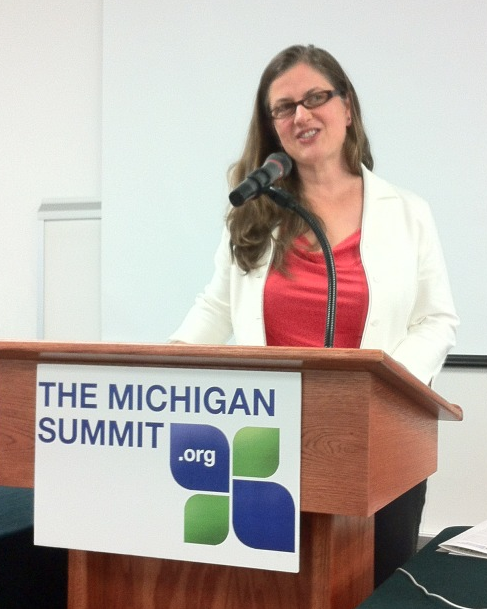 Leslie is telling us about places that are, believe it or not, worse than Michigan in terms of progressive issues, workers and democracy. The first place is Orange County, Florida.
Leslie is telling us about places that are, believe it or not, worse than Michigan in terms of progressive issues, workers and democracy. The first place is Orange County, Florida.
“This isn’t a story about individuals, it’s a story about individuals working together to effect change.”
Local organizers in Orange County took over their neighborhood association that was run by wealthy white people and transformed it into a group that worked for the non-wealthy folks who lived there. In fact, she said, when these Latino activists got involved, the people who had been in charge all walked out. Through their efforts, they helped transform the Anaheim city government and made it more responsive to the diverse community there.
In New Haven, Connecticut, local activist Delphine organized people to help have a voice that was historically drowned out against Yale University. A coalition of local progressive leaders ran for city council. 17 ran, 16 won and the city council was transformed into a government that works for the people of New Haven, not just the university.
“We need to train ourselves on how to ask for more and have a more vocal presence in our local governments.”
In Colorado, Leslie was present when they passed a major anti-gay initiative, became a modified right to work state and took other anti-progressive steps. Labor organizations were absent from the conversation so she ran for a leadership position on the union board. They took the state from nearly becoming full-blown right to work to state and progressives took over the state government including the Denver city council in the late 90s. They are now implementing policies that give citizens a voice they previously did not have.
“You actually can change things from the ground. It doesn’t happen from Washington. You need to be thinking about who in your neighborhood should be leaders, hold them accountable and give them space to succeed.”
Next up: Breakout Session #1
 I obviously can’t be in three places at once so I’m attending the “Connecting Data With Action” panel. The panel is Nick Conti-Masang (VVN), Eric Keller (Clean Water Action), Liz Ratzloff (Planned Parenthood), and Danielle Atkinson (Mothering Justice). The moderator is Patrick Schuh with Two Peninsulas Research Group.
I obviously can’t be in three places at once so I’m attending the “Connecting Data With Action” panel. The panel is Nick Conti-Masang (VVN), Eric Keller (Clean Water Action), Liz Ratzloff (Planned Parenthood), and Danielle Atkinson (Mothering Justice). The moderator is Patrick Schuh with Two Peninsulas Research Group.
Patrick Schuh: “We need to figure out which medium is best for connecting with our audience and which approach in the medium is most effective at getting our audience to take action.”
Nick Conti-Masanz talked about the tools we have at our disposal. The first is the Voter Activation Network (VAN). This powerful database has information on the voters of Michigan. Using this and connecting it with contact information, groups can track contacts with individuals and connect that with their voting patterns. Other databases include Salsa, Constant Contact and other list management tools to allow groups to manage how they reach out to their constituencies.
Danielle Atkinson discussed starting from nothing and building a new system. Mothering Justice uses the “power of moms”, primarily mothers of color to advance their vision on issues like financial stability through activism, leadership, and advocacy. They have used data to build their organization. By using data analysis on their various lists, they defined their universe, engaged mothers using social media/data and identified activists. This allowed them to come up with a pool of thousands of activists. Data helped them be more effective and targeted.
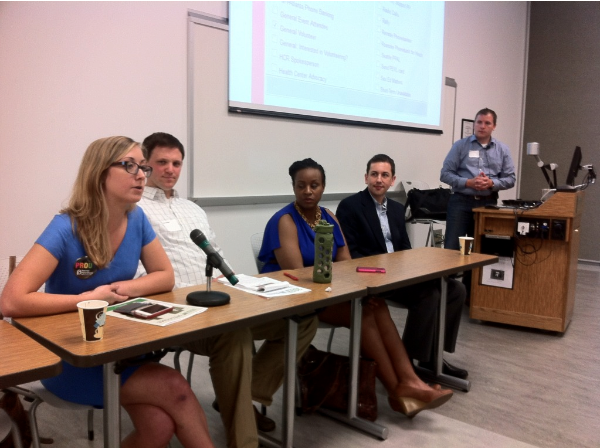
Eric Keller talked about how Clean Water Action’s door-to-door campaigns generated enormous amounts of paper. In the past, analyzing the data was “a really cumbersome process to undertake”. The process used to range from getting sheets printed, sorted, distributed and then entered into spreadsheets and sent to the national organization for processing. Getting access to that data later and extracting useful information from it was a lengthy process with a significant time lag. Eric estimated that no fewer than 13 people touched the signature sheets in it’s lifetime.
This process has been transformed though the use of mobile digital tablets. It dramatically improves the turnaround time between initial conversations and follow-up connects, reduces the paper chase and makes them profoundly more effective. They were able to upload the data to the VAN quickly and easily and then use data analysis for more effective targeting of their universe.
Liz Ratzloff talked about data from perspective of an organization that is in nearly constant campaign mode. She walked the attendees through the process of entering data all the way through turning each contact into an activist at one level or another. Through smart tagging of contacts in the VAN, they are able use their data to mobilize specific groups to take action, targeted groups identified as being most likely to get engaged on a specific issue. Tags include things like postcard signer, petition signer, event participant/attendee, volunteer prospect and financial contributor. When issues arise — legislative hearings, for example — through this use of data, they are able to be much more effective at turning out people to take action like phonebanking, canvassing, or contacting lawmakers.
Gubernatorial Candidate Mark Schauer has arrived, shown here with activist/organizer extraordinaire Lacy Dawson of Detroit:
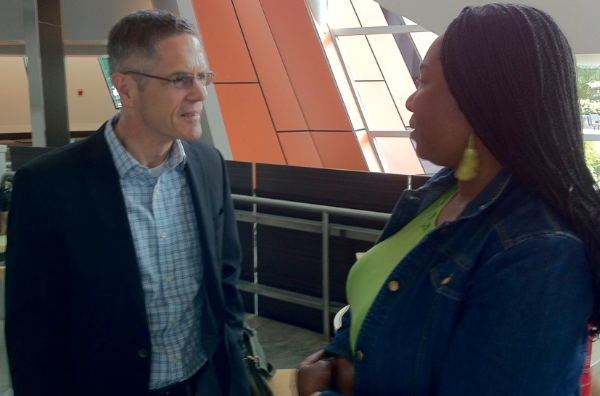
UAW President Bob King is next up. He’s being introduced by Jocelyn Benson.
 “Everybody in this room believes in activism. We know we can’t deliver the justice people deserve unless we come together.”
“Everybody in this room believes in activism. We know we can’t deliver the justice people deserve unless we come together.”
“There is a greater awareness, not just in Michigan but across the country, that we have to form these coalitions.”
“None of us, no matter what our cause is…, none of that was won in the legislative halls. They were all won because there was a progressive movement…with non-violent action.”
“I don’t feel good about immigration reform. I think our opponents are going to drag it out with all sorts of amendments.”
“We will never win these battles unless we build these sorts of movements.”
“The women’s movement, the faith community, labor, environment, we all need to come together to win these battles.”
“All of us, every day, have to think of ourselves as organizers.”
On the topic of immigration reform, King pointed out that immigrant workers aren’t a threat to the American labor movement and its union members. “They’re not going to take your jobs away. They’re already here. They’re going to lower your wages unless we protect them.”
“We are ALL stronger when we work together.”
“I want to commit to all of you here: the UAW will be here for YOU in Michigan.”
“You get people involved by asking. Sometimes it takes three asks. Sometimes it takes 15 asks. Sometimes it takes 100 asks. No matter how many asks it takes, once you get them out to take action…it changes them. It’s our job as organizers that we never quit asking.”
Cyndi Roper of the Michigan Voice just announced that Progress Michigan has recently received a grant that will allow them to begin a “Michigan Summit Speakers Series” that will allow them to take the Summit on the road. This is very good news.
The five 2013 Organizer of the Year finalists are:
- Danielle Atkinson – Mothering Justice
- Mike Berkowitz – Sierra Club
- Anita Dawson – A. Philip Randolph Institute
- John Keserich – Planned Parenthood Advocates of Michigan
- Deb Williamson – Michigan Roundtable for Diversity and Inclusion
And the winner is … Danielle Atkinson with Mothering Justice!!!
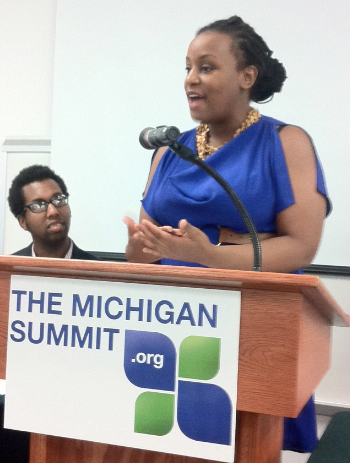
Next up: Breakout Session #2
I’m attending the Voter Empowerment, Election Administration Challenges and Solutions breakout panel. This panel is moderated by Jocelyn Benson, the Dean of the Wayne County Law School and former candidate for Secretary of State. Panelists are Ryan Irvin – Political Consultant and former OFA State Field Director, Oakland County Clerk/Register of Deeds Lisa Brown and former state Representative, and Lansing City Clerk and former Executive Director of Michigan Equality Chris Swope.
Ryan showed that roughly 15 million Americans don’t vote who are eligible to do so. About 40% of these people are unable to vote because they are ill or “too busy”. The rest of these people simply aren’t engaged.
Ryan talked about the absurd number of people in Michigan that had trouble voting due to errors at the polling location and people who had to wait for extraordinary lengths of time to vote. “Voting could be something that’s much more global, much more easy and much more universal.”
Chris Swope talked about the immense amount of time it takes for local municipalities to prepare for elections. Since he became City Clerk, he said, every single year there have been changes and these can cause “slip ups”. Making sure people know where they need to go to vote and dealing with equipment issues are both challenging for election officials. He believes the state needs a new system before the next presidential election. He’s also a proponent of no-reason absentee voting.
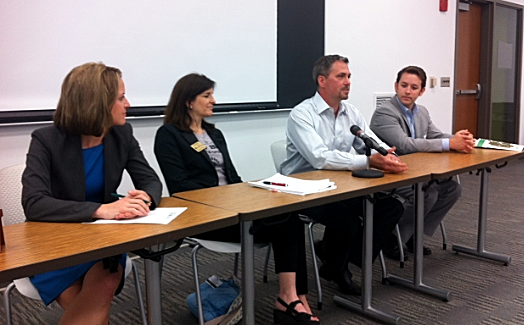
There was a great deal of discussion about the challenges of training workers. All seemed to believe a better system is need to create a uniform and effective way to train elections workers. For example, precinct delegates often receive a large number of write-in candidates and that’s not straight forward. Standardizing the training with a test to be sure people are qualified to be poll workers is something that would help a great deal.
Chris Swope commented on the fact that our current Secretary of State seems more intent on stopping a tiny number of unqualified voters from voting than she is making sure a large number of qualified voters CAN vote.
None of the panelists believe that any significant voting reform will happen under the current legislature.
Jocelyn indicated that there are things that local elections officials can do to improve our elections. For example, Lisa said that in Oakland County they are in the process of conducting audits to find out where challenges and problems and exist so that they can improve their system.
Last up: Breakout session #3
The panel I’m attending is called “The Crisis of Unequal Representation” which will cover the redistricting and gerrymandering mess that has so royally screwed up our state. It is moderated by political consultant Jon Hoadley of Badlands Strategies and the Michigan Election Coalition. The panelists are Jocelyn Benson, Ingham County Clerk and former State House Representative Barb Byrum and Butch Hollowell, the Detroit NAACP Legal Council and former Michigan Democratic Party Chair.
Jocelyn talked about how districts today are drawn by elected officials which makes the process partisan and self-serving. She showed a graph of GOP senate redistricting in 1998, 2002, and 2006 and how they controlled far more districts than their numbers justified. The same thing happens, of course, when Democrats are in charge. This is a direct result of the partisan nature of the redistricting process. In 2011, her group invited Michigan citizens to participate in a competition where they crafted and designed their own district maps. This resulted in district which were far more fair and balanced. The winner, ironically, was the College Republican Party chair from Central Michigan University.
There are efforts to have a Citizen Commission to control redistricting and Rep. Sean McCann has introduced legislation pending to this. The commissions must include:
- Meaningful independence to avoid simply replacing the current system with one with the same partisan outcomes
- Meaningful diversity so that all voices are representated
- Meaningful guidance with explicit criteria, guidelines and rules
- Meaningful transparency with adequate citizen participation and input
Barb said, “I have kids who play with crayons and even they could draw districts that make more sense than some of the ones we have now.” She cited the failure of Michigan legislators to pass Medicaid expansion as some of the outrageous fallout from gerrymandering that has created the “backwards C district”, the “S District” and the infamous “Jesus district”. It’s time for reform, she said.
Butch talked about how we spend an inordinate amount on each prisoner in Michgan than we do on each student. “All the issues you care about are derivative of an independent commission drawing the district lines,” he said.
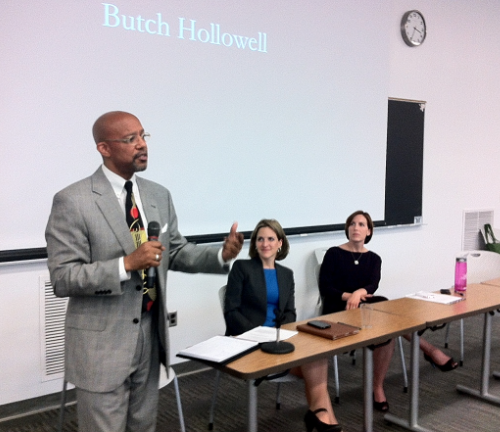
“Redistricting pertains to state district lines, reapportionment applies to (federal) Congressional districts.”
Butch talked about how redistricting in Michigan has marginalized minority voters in Michigan by creating districts that did not represent the minority makeup of those district. This prevented these communities from exercising “a cohesive electoral voice” in our state. “Plan B” is to create an independent panel to be responsible for redistricting. “Plan C”, he said, is that we fight each and every instance where redistricting has created unfair districts.
The solution to this problem, Barb and Jocelyn, is a ballot initiative to change the process and the rules. Barb said we must all take responsibility for talking to our family, friends, and coworkers about making these changes to reform redistricting in our state. Butch, not surprisingly based on the fact that he “bears the scars of the recent emergency manager ballot proposal fight”, was somewhat less enthusiastic. Why? Because, in that case, the state legislatures ignored the will of the voters and changed the rules to what they wanted them to be. He said he’s “99% in support” of a ballot initiative but is worried that Republicans will simply change the rules after the citizens weigh in.
Jocelyn emphasized that we need to tell our own stories about how we are having our voices squelched by gerrymandering.
That’s it for the liveblog. Have a great weekend!
Well, one more thing:
Heard today at the @michigansummit: @SugarLawCenter will be filing a new lawsuit to repeal the Emergency Manager law later this month.
— Chris Savage (@Eclectablog) June 8, 2013
[All crappy iPhone photos by Chris Savage | Eclectablog]



